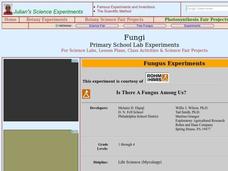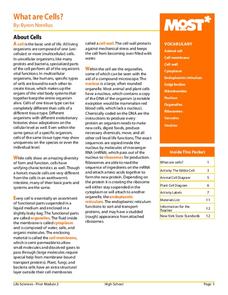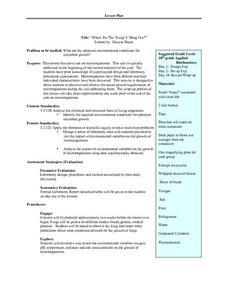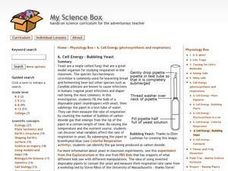University of Florida
Investigating the Fungus among Us
What do you call a fungus that writes music? A decomposer! Here, young biologists explore fungus by tasting fungus (blue cheese) to creating art with fungus to playing a board game centered around, you got it, fungus. Surprise...
Resources for Educators
Math & Science Connection
Whether you're using a collection of Dr. Seuss books to teach basic math skills like counting, adding, and subtracting, or exploring the different states of matter by melting a crayon with a hairdryer, a series...
Biology Junction
Fungi Coloring Worksheet
In this biology instructional activity, students complete 28 short answer questions on fungi. They color and label the different parts of a hyphae.
Curated OER
Finding Fungi in the World Around Us
These lesson ideas will help your students explore the diversity of Kingdom Fungi.
Illinois Department of Natural Resources
Section One: What is Biodiversity?
Four intriguing and scientific activities invite learners to explore the natural resources of their town. The activities cover concepts such as genetic traits, organizing species in a taxonomy, the differences between different species...
Baylor College
The Variety and Roles of Microbes
Mini microbiologists play a card game in which they group microorganisms by groups: virus, fungus, protist, or bacteria. Then they identify the roles different microbes play in the natural world and explore how humans effectively use...
Curated OER
Crime Scene Investigation (CSI) with Powdery Mildew Fungi
Middle schoolers explore a specific method of identifying fungi, using a written key and an illustrated key. Powdery mildew fungi can be identified to genus by the morphology (appearance) of the sexual stage (cleistothecia).
Curated OER
Fungus
Students study fungus, its reproduction and uses. In this eukaryote instructional activity students complete several fungal experiments.
Towson University
Chestnut Tree Lab
What will your class learn in a curious tale of a fungus, a virus, and a chestnut tree? Biology scholars discover the world of viral biocontrols through a DNA restriction lab. Groups research the decline of the American chestnut tree at...
Curated OER
Is There A Fungus Among Us?
Sixth graders classify fungus into two different groups. In this fungus activity, 6th graders collect as many pieces of fungus as possible. Students then classify these pieces of fungus as saprophytic or parasitic.
Curated OER
Fungi
Learners examine the characteristics of fungi. In this biology instructional activity, students investigate the factors needed for fungi growth. They collect data and observations and write a report about them.
Michigan State University
In Search of Life
Explore the habitats around you with an activity that takes kids out of the classroom to learn about the local variety of habitats and the living things that call them home. In small groups, scholars investigate their surroundings,...
Curated OER
What Are Cells?
Energize the cells of young biologists with an edible life science activity. Engaging learners in exploring the inner workings of plant and animal cells, this activity involves using colored jello and various sweet and...
Science 4 Inquiry
The Classification of Living Things
It's a classification sensation! Demystify why we classify using an inquiry activity that helps your class sort things out. Groups begin by classifying a variety of shoes before they research organisms and design their own dichotomous...
Curated OER
What a Fungi
Seventh graders perform an experiment to determine the best growing conditions for molds. In this life science lesson, 7th graders explain where molds are commonly found. They collect data and draw diagrams of their observations.
Curated OER
Level III: Technology Integration
Fourth graders prepare two spreadsheets each with an embedded line graph that displays data about the growth of the bitter rot fungus on apples and on petri dishes that were stored in the refrigerator and the classroom. They prepare a...
Virginia Department of Education
Prokaryotes
Lead your biology class on a cell-sized adventure! Emerging scientists construct models of prokaryotes, then design an experiment to properly grow a bacterial culture. They conclude the activity by viewing the culture under a microscope....
Curated OER
"Where Do The 'Fungi's' Hang Out?"
Tenth graders engage in a lesson plan looking for the ideal conditions for microbial growth. The lesson plan is to be given once they have background knowledge about microbes. Students set up a lab in order to grow cultures over a period...
Curated OER
TE Activity: How Fast Can a Carrot Rot?
Students experiment to define which environmental factors favor decomposition by soil microbes. They decompose carrots in dirt, weigh the carrots periodically to determine how long it takes. They look at how engineers use this type of...
Curated OER
Effects of Bread Sanitary Conditions on Mold Growth
Students examine fungi and where it comes from. In this mold instructional activity students determine the percentage of fruit juice in a fruit then identify the different types of mold.
Curated OER
Cell Energy - Bubbling Yeast
Students identify that yeast are a single celled fungi that are a great model organism for studying respiration in the classroom. They also fill the bulb of a disposable pipet (eyedropper) with yeast, then submerge the pipet in a test...
Curated OER
Microorganisms
Though there are seventy-seven slides in this PowerPoint, only small bits of information are presented on each. It outlines the roles microorganisms play in the environment and spends time listing characteristics of each four different...
Curated OER
The Fungus Among Us
Young scholars explore the basic characteristics and roles of fungi. They discuss the importance of fungi to humans. Students investigate the relationship between cell structure and function and explore the diversity and variation of...
Curated OER
Powdery Mildew Fungi: Classification and Ecology
Students use a written key or illustrated key to identify fungi on plant leaves into its genus based on sexual or asexual reproduction, host range diversity, and host-parasite relationships.

























